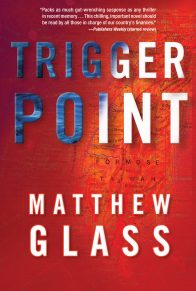He came onto the stage just before eleven o’clock. In studios across the country, analysts and pundits were cut off as producers switched to the stream from Phoenix. By now the outcome wasn’t in question, only the margin of victory. Vermont, the first state to be called, had kicked off a landslide rout that was roaring south and west as the evening progressed. One swing state after another came in. Ohio, where it was now one a.m., had been called for him almost as soon as the polls closed. Florida had joined his column a bare half hour later.
Dick Moberly, Arizona state chair off the Democratic Party, was onstage to introduce him. Dick was a short, round guy and every time he tried to start talking, the crowd whooped louder. He personally knew just about everyone in the hall. An excitable character at the best of times, he wasn’t exactly helping his cause. Instinctively, as the crowd yelled, his arm went up and he punched the air.
“Okay, okay,” said Moberly eventually.
A few more stray yells came from the floor. Dick grinned but managed to keep his arm down. Finally there was silence. “Ladies and gentlemen, I give you the senior senator of the fine state of Arizona. I give you the president-elect of the United States of America . . . Joseph Emerson Benton!”
On cue, into an explosion of light and noise, he came out with his wife, Heather, and his two grown-up children, Amy and Greg. Joe Benton was a tall man, lean, with a handsome head of silvering hair, a fine straight nose, and deepset brown eyes that gave him an expression of seriousness and focus until his twinkling smile cracked it open like the top off a can. The smile cracked open now.
For two minutes solid, the crowd yelled. It wasn’t words, it was just noise, sheer exuberance made into sound. The senator held up his hands. Then he turned to Heather, and Heather smiled, and then he held up his hands again, thumbs up. Still the noise went on. He dropped his arms and somehow, somehow, managed to bring it to an end.
“Friends,” he said, “today the American people have made a bold choice. They have chosen to face our shared challenges with a strong heart and a brave will. They have chosen to create a new foundation. I can tell you that I have just received a call from President Gartner, who has graciously—”
Joe Benton had to stop as the noise rose in the hall. He smiled again, nodding.
“I have just received a call from President Gartner who has graciously conceded defeat in this election. I thanked him for putting up a fine, fair fight, which was a credit to our democracy.”
There were sardonic cries from the crowd. The tactics of the Gartner campaign had turned as dirty as any in living memory when the true threat of Joe Benton’s challenge became apparent. But it was too late by then. Nothing Gartner’s people could invent came near enough to stop him.
A total of forty-six men and one woman in history had preceded Joe Benton in reaching this point, the announcement of election to the presidency of the United States. Like each one of them, he had followed his own individual, personal path to this moment. Each progress to the presidency is an odyssey, and each odyssey is unique, an unpredictable combination of circumstance, personality, timing and luck. Joe Benton was a three-term senator from Arizona. In his first term he was already being spoken of as a potential Democratic presidential contender, and speculation about him had gone on so long people had begun to believe he would never run. Too upright, too principled. Straight Joe Benton, as he was known in Arizona. But Benton knew there was only one way he could present himself as a candidate, he couldn’t offer anything but the policies and the programs he knew to be right. Four years earlier, under extreme pressure to run against Mike Gartner’s first bid for the presidency, he had reluctantly judged that the American people wasn’t ready for the message he would give. In the end he declined to join the race, and the general view was that his moment had passed.
A lot had changed in those four years. Back then, Joe Benton was one of the few politicians of national stature talking seriously about Relocation. Not now. With two consecutive years of extreme floods on the Gulf Coast, Relocation had surged onto the mainstream agenda like a storm wave out of the Caribbean and Gartner had been forced to go to Congress for a funding package to move people out of areas that had become patently uninhabitable. Miserly and inadequate as the package was, it established Relocation as a central issue for the upcoming election. How had the situation reached such a dire state? Why were millions of people now to be uprooted and moved, and why had so little—nothing meaningful, in reality—been done to prevent this? Mike Gartner, as president for four years and vice president before that for eight, found it difficult to put daylight between himself and the answers to those questions. The electorate was growing disenchanted with other aspects of Gartner’s administration. Unilateralism in foreign policy. Disengagement from the Kyoto process. The long U.S. military presence in Colombia and Pakistan. At home, a little too much of caring for the rich and letting the poor find their own way. This time around, as people began urging him to run, Joe Benton could feel a difference. Maybe there was an audience for his message, and maybe it was big enough not only to send him to the White House but to send enough Democrats to Congress to let him get on with the job. As the fall turned to winter, a support base coalesced for him out of the left, the center right, middle-class women, and ethnic minorities who wanted that message to be heard.
And so he hammered it home. No fancy sales pitch, no window dressing, just the simple things in simple language. Health. Education. Relocation. Jobs. A four-part package, New Foundation, as he called it. He hammered the message home, unwavering, undeviating, while Gartner’s people tried their tricks. And the more they tried, the more it looked as if Mike Gartner from Virginia didn’t have an answer to Straight Joe Benton out of Arizona, the more tired Gartner looked, the more oily, the more untrustworthy. Circumstance, personality, timing and luck. Through the spring and on into the summer, support for the Benton juggernaut kept on growing. After successive Republican administrations, this one was coming to an end.
“I want to thank everyone who worked so hard for the Benton-Chavez ticket. I recognize so many faces as I look around here tonight. Arnie . . . Margaret . . .” Joe Benton pointed to a couple of longtime party workers whose faces he saw, and cheering erupted in the hall around them. “Too many to name. I thank each one of you, in this room, in the country, wherever you are tonight. I don’t know if you realize what an awesome job you did. It was a long road. I remember New Hampshire. Do you remember New Hampshire? That was cold.” Benton’s face cracked in his trademark smile. “Almost too cold for a Phoenix boy.”
The crowd roared.
“Almost. But not quite.”
The crowd roared again.
“But we made it. You know what? We’re here!”
He nodded, and the roof almost came off the hall. He glanced at Heather and the children, and they smiled back at him.
“I won’t keep you long. I know you’ve got a lot of partying to do. Enjoy it. You deserve to. This is a good night for the Democratic Party. I believe we already have six new senators, four governors, and a whole clutch of fine new representatives. And the night is young. This is a good night. Not only for our party, but for our country.”
There were cheers.
“For our country. Because whatever our differences, whatever has been said and done over the past months in the spirit of a free and fair election—an election that has been contested hard, and strong, which is exactly how it should be contested—whatever is past, is past, and my job now, the thing I have been asked to do, is to work for all Americans, to make life better for all Americans. And from this moment, that is what I intend to do.”
The noise had died away. Everyone in the hall knew something more serious was coming.
“Friends, we have work to do. If we have achieved anything in this election today, it’s only a prelude, it’s only so that we can start to achieve more, much more tomorrow.” He gazed around the room. “The challenges we face are great. But we can face them with confidence, because if we have the courage truly to face them, to measure up, we will overcome them. Not only overcome them, but build on them to create a better country for ourselves, for the ones we love, and for everyone with whom we share this land.”
An absolute hush had fallen in the ballroom. Every eye was on the senator, every face absorbed. Joe Benton knew that at this moment, all over the country, all over the world, on home screens, on their handhelds, people were watching him. These words, he knew, these images, would be restreamed for days to come. Right here, right now, his presidency began.
He had thought long and hard about the words he would utter next. They had been carefully crafted. Benton didn’t want to be triumphalist. There was too much work ahead for that. But he didn’t want to dampen the exuberance his people deserved to feel on this night. Yet he wanted everyone to know that even in the midst of celebration, the work, for him, had already started. The size of the task awaiting him, he knew, was extraordinary. Even with a majority in both houses of Congress—which now looked within reach—there was no certainty he would be able to do all that needed to be done. Everything would have to go right. And Joe Benton had been in politics long enough, had watched enough presidents and seen their support shrink and their pledged programs unravel under the pressure of events, to know that it never did.
But he also knew he would never get people even to make a beginning unless they believed he would get them all the way to the end. More than anything, he wanted these words to make people eager to start, to make them trust that if they went with him now, if only they took the first steps that he was asking of them, they would find a good, solid path ahead.
He spoke calmly, matter-of-factly.
“We must take care of each other. This has been the spirit of our republic since its founding days. If we have lost a little of this spirit, we must regain it. In the next years, we will face a great migration. Together, we can make this a time of renewal and growth. Here is the promise that I ask you to make with me. Each one of our fellow Americans who must uproot themselves will find a better life among us—not a worse. They will find the warm hand of friendship—not the cold shoulder of hostility. Communities that welcome them—not shun them. Rarely does a country have the opportunity to remake itself for the better. Those who live at such a time are blessed. My friends, we have this opportunity. It isn’t something to be feared, but to be welcomed. It won’t be easy, but I ask you, if any country can do it, surely it’s these United States of America, this republic that has grown, endured, and prospered through more than a quarter millennium in human history, that is the one that can. Today, the American people have given me the responsibility to make sure that we do not miss this opportunity. From this moment, I will do everything in my power to make sure we succeed. Tonight, I ask each one of you—Democrat and Republican, black and white, Christian, Jew, Muslim, Buddhist or atheist, gay or straight, anyone and everyone in this great community of our republic—join me.”
The senator stopped speaking. For a moment, his words hung silently in the hall. Then applause began, and it swelled, and soon the room was a thundering chamber of noise.
In network studios, on screens around the world, people saw Joe Benton reach for his wife and put his arm around her. They saw her whisper something into his ear, and he looked down at her and nodded. They saw him look around for his two children, who came closer, and he put his other arm around his daughter. The images zoomed in, and people saw his fine, lean face—a face they knew would become increasingly familiar to them over the coming four years—and they saw a slight furrowing of the brow, a slight clenching of the jaw, as he contemplated the hall before him, contemplated the responsibility he had just taken upon himself.
Joe Benton leaned toward the microphone. His face cracked in a smile.
“Goodnight,” he said. “God bless you. God bless the United States of America.”













